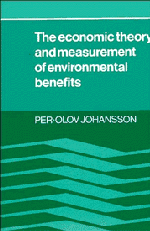Book contents
- Frontmatter
- Contents
- Preface
- 1 Introduction
- 2 Some basic concepts
- 3 The concept of consumer surplus
- 4 Topics in the theory of consumer surplus measures
- 5 Consumer surplus measures in quantity-constrained regimes
- 6 Public goods and externalities in consumption
- 7 How to overcome the problem of preference revelation; practical methodologies
- 8 Discrete choice models and environmental benefits
- 9 Consumer's surplus in an intertemporal context
- 10 Welfare change measures in a risky world
- 11 Money measures of the total value of environmental assets
- Notes
- Bibliography
- Index
- Frontmatter
- Contents
- Preface
- 1 Introduction
- 2 Some basic concepts
- 3 The concept of consumer surplus
- 4 Topics in the theory of consumer surplus measures
- 5 Consumer surplus measures in quantity-constrained regimes
- 6 Public goods and externalities in consumption
- 7 How to overcome the problem of preference revelation; practical methodologies
- 8 Discrete choice models and environmental benefits
- 9 Consumer's surplus in an intertemporal context
- 10 Welfare change measures in a risky world
- 11 Money measures of the total value of environmental assets
- Notes
- Bibliography
- Index
Summary
Scope of the study
The environment provides the economy with raw materials and energy. Ultimately these return to it as waste products. The environment also provides services directly to consumers, such as air to breath, water to drink, and recreational opportunities.
In many cases an environmental asset provides different but conflicting services. For example, a wilderness area can be left unspoiled and used for various recreational purposes or it can be commercially exploited by harvesting the trees. This is an example of a kind of land-use conflict that has become increasingly important during the last decade. In many countries, one would expect still more severe conflicts in the future between ‘development’ interests and ‘conservation’ interests. Similarly there is an increasing awareness of the fact that pollution, e.g. acid rain, reduces the benefits derived from recreational activities as well as the value of real estate. In addition, the health of human beings as well as the existence of some species may be threatened by various human activities. A well-known example of the latter is the blue whale stock whose growth has been insufficient to prevent the depletion of the animal almost to extinction. Besides the fact that a living stock of blue whales has a value in itself to most people, there is also the possibility that an extinction may imply the loss of some unique genetic material that may turn out to be useful in, for example, medicine sometime in the future.
- Type
- Chapter
- Information
- Publisher: Cambridge University PressPrint publication year: 1987
- 1
- Cited by



